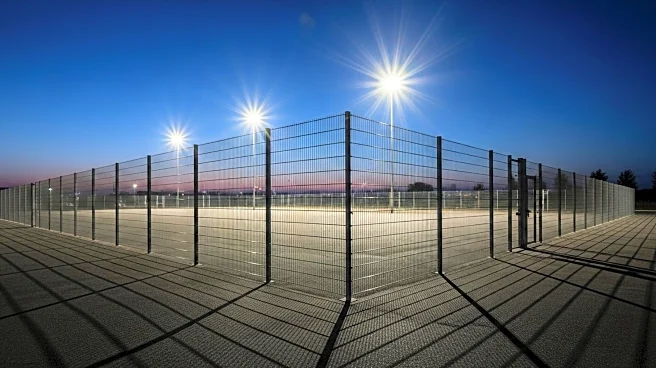What's Happening?
President Trump's administration has awarded a $1.2 billion contract to Acquisition Logistics LLC to build and operate a large immigration detention complex at Fort Bliss, Texas. This decision has raised questions due to the company's lack of experience in running correctional facilities and its modest background. The facility, named Camp East Montana, is situated in the Chihuahuan Desert near the U.S.-Mexico border and is expected to house up to 5,000 migrants. Concerns have been voiced by Rep. Veronica Escobar regarding the potential for standards to slip, given the profit-driven nature of private facilities. The Pentagon has not released details about the contract, and a competitor has filed a complaint challenging the award.
Why It's Important?
The contract reflects the Trump administration's commitment to increasing immigration enforcement and deportations. The use of military bases for detention purposes marks a shift from civilian agency responsibilities, raising concerns about transparency and oversight. The decision to award the contract to a small, inexperienced firm has sparked debate about the effectiveness and safety of such facilities. The broader implications include potential impacts on immigration policy, human rights, and the role of private companies in government operations. Critics argue that the lack of transparency could lead to abuses and neglect, especially in remote military locations.
What's Next?
The contract award is under scrutiny, with a protest filed by a competing bidder, Gemini Tech Services, challenging the qualifications of Acquisition Logistics. The U.S. Government Accountability Office is expected to rule on the matter by November, and a legal appeal is pending in federal court. The administration plans to expand detention facilities at other military bases, which may lead to further legal and political challenges. Stakeholders, including advocacy groups and lawmakers, are likely to continue pushing for greater transparency and oversight in the contracting process.
Beyond the Headlines
The use of military bases for detention facilities harks back to historical precedents, such as the internment of Japanese Americans during World War II. This raises ethical concerns about the treatment of detainees and the potential for human rights violations. The reliance on private companies for detention operations highlights the intersection of profit motives and public policy, prompting discussions about the privatization of immigration enforcement and its consequences.










